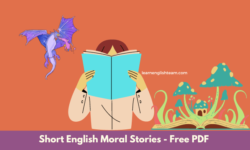English Words Related to Time – IELTS Vocabulary
Time vocabulary can be the difference between a Band 6 and a Band 8. I once asked a student in Speaking Part 2 to describe a “memorable day.” He gave a good story but kept saying “then” and “after that.” No sign of in the meantime, eventually, or even at that moment. It felt flat — not fluent. After we practiced time expressions, his answers flowed better and felt more natural. He later told me, “Those words changed the way I think in English.”
In this lesson, you’ll learn useful time-related vocabulary, idioms, and collocations that often appear in IELTS tasks. They’ll help you speak with precision, write with structure, and listen or read more clearly. And yes — there’s a free downloadable PDF at the end so you can review everything at your own pace.

Why Learn Time-Related Vocabulary for IELTS?
Time is a central theme across all four IELTS sections. Mastering vocabulary related to time helps you respond fluently, understand complex texts, and describe trends clearly and accurately. Here’s how time vocabulary appears in the IELTS exam:
IELTS Exam Relevance:
- Speaking Part 1 & 2: Often includes questions about daily routines, past memories, and future plans.
- Writing Task 1 (Academic): Requires you to describe changes and trends over time using charts and graphs.
- Reading: Many passages follow a chronological sequence, so recognizing time markers can improve comprehension.
- Listening: Identifying time cues helps you follow conversations and monologues effectively.
Common English Words and Phrases Related to Time
Basic IELTS Time Vocabulary
- Decade – a period of ten years
Example: The city has changed dramatically over the last decade. - Century – a span of 100 years
Example: The building dates back to the 19th century. - Era – a significant historical period
Example: We are living in the digital era. - Millennium – a thousand years
Example: The year 2000 marked the start of a new millennium. - Schedule – a plan of activities and times
Example: I follow a strict study schedule during exam season. - Deadline – the latest time something must be done
Example: I submitted my application just before the deadline.
Time Expressions for IELTS Speaking & Writing
- In the long run – over an extended period
- At the eleventh hour – at the last possible moment
- Ahead of time – earlier than expected
- Time-consuming – requiring a lot of time
- Once in a blue moon – very rarely
Example: I only go to the cinema once in a blue moon due to my busy schedule.
Collocations & Phrasal Verbs with “Time”
- Make time for – to allocate time for something
- Run out of time – to have no time left
- Kill time – to pass time while waiting
- Take your time – to do something slowly
- Set aside time – to reserve time for a task
Advanced IELTS Vocabulary Related to Time
- Ephemeral – lasting for a very short time
Example: Beauty is ephemeral, but knowledge lasts longer. - Transient – temporary or short-lived
Example: His role in the company was transient. - Procrastinate – delay or postpone action
Example: Students often procrastinate before deadlines. - Simultaneously – happening at the same time
Example: Both classes started simultaneously. - Intermittent – occurring irregularly
Example: The internet connection was intermittent during the storm.
IELTS Idioms About Time
- Beat the clock – finish before time runs out
- Call it a day – stop working
- Time flies – time passes quickly
- Behind the times – old-fashioned
- Have the time of your life – enjoy something very much
Example: I had the time of my life during my summer internship.
IELTS Speaking Cue Card Sample – Part 2
Describe a time when you were late for something important.
Sample Answer:
A few months ago, I had a university interview. I had everything prepared ahead of time, but due to unexpected roadwork, I reached the campus at the eleventh hour. I was flustered but quickly composed myself. Thankfully, I performed well and was offered a place. This experience taught me to set aside more time when traveling to important events.
Memory Tip: Make Vocabulary Personal
Instead of just memorizing lists, connect each word to a real memory. For instance, remember the last time you missed a deadline, or the feeling of procrastinating before an exam. The more personal the memory, the better you’ll recall the word.
Free IELTS Time Vocabulary PDF
Download your free PDF guide with IELTS time-related vocabulary and examples for quick review and practice:
Click here to download the IELTS Time Vocabulary PDF
Frequently Asked Questions (FAQ)
Words like schedule, deadline, duration, occasionally, and in advance are commonly used in IELTS writing and speaking tasks.
Can I use idioms in IELTS Speaking?
Yes. Idioms like “beat the clock” or “time flies” can enhance your responses. Use them naturally and make sure they fit the topic.
How do time expressions help in Writing Task 1?
They help describe trends and time-based changes in graphs. Phrases like “over the next decade” or “from 2005 to 2015” improve clarity and coherence.
Final Thoughts
Building a strong vocabulary around time isn’t just about getting a good IELTS score—it’s about mastering English for real-life use. Review these words regularly, use them in speaking and writing practice, and make them part of your active vocabulary.
Next Step: Write a short paragraph about your daily or weekly routine using at least five expressions from this article.



